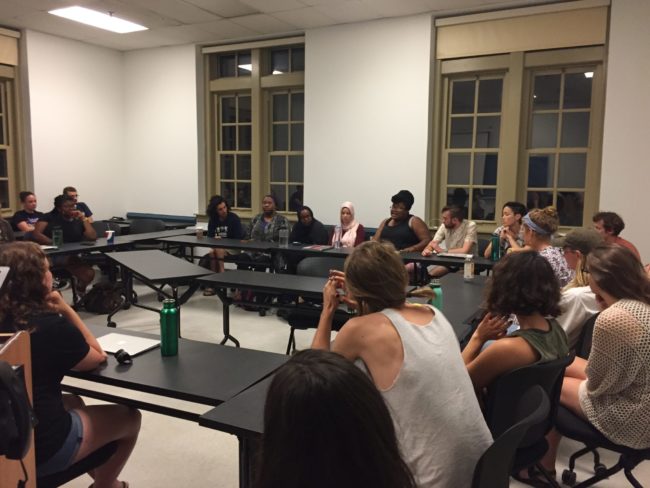Students came out to Washington Hall Wednesday, Sept. 13 to discuss the events that occurred in Charlottesville, Va. a month ago and to offer support to one another. The event was hosted by The Black Voice, Black Lives Matter W&M, W&M Student Power and William & Mary Young Democrats.
Statewide core team member for W&M Student Power Renee Liden ’20 began the discussion by asking everyone present to describe their reaction to the White Supremacist rally in Charlottesville in one word. Reaction words included “unsurprised,” “disappointed,” “scared,” “sick,” “shaken” and “angry.”
Students then spoke out with longer responses to what happened in Charlottesville and how they could make change going forward. Liden said that her perspective had changed since coming to the College and she realized that she was part of the problem.
Coming to William and Mary and learning more, it was a huge wakeup call realizing that the entire society is infected with racism,” Liden said. “And recognizing that I’m a part of that and my existence is a part of white supremacy. I’m still learning what I can do about it.”
“Coming to William and Mary and learning more, it was a huge wakeup call realizing that the entire society is infected with racism,” Liden said. “And recognizing that I’m a part of that and my existence is a part of white supremacy. I’m still learning what I can do about it.”
Annika Hackfeld ’19 said that it is not enough to believe racism is bad, but that individuals must be actively speaking out against racism.
“If you disagree with racism, if you think racism is a bad thing, that means you’re human,” Hackfeld said. “If you think racism is good then you’re less than. You can’t just not be racist, you have to be anti-racist.”
Some students present disagreed with Hackfeld’s statement that people who believe “racism is good” are “less than,” saying that dehumanizing those who do not have similar values to theirs is just as bad as white supremacy.
Editor-in-Chief of The Black Voice Camryn Easley ’20 disagreed with this sentiment. Easley said that she did not think it was logical that people today believe it is not acceptable to condemn those that express pro-white beliefs while society condemns Hitler for his pro-white convictions in the past.
“We learn in history about Hitler, who is the worst,” Easley said. “We hate Hitler. Hitler isn’t a person. If I saw baby Hitler I would punch him in the face. But if you think about what Hitler was doing, creating the ethno-state, killing non-whites, that’s literally what neo-Nazis and white supremacists are saying today and I find it very interesting that all of a sudden now, we can dehumanize Hitler, but this is the present and we need to consider how people feel. But I don’t agree with that. You can’t tell me to respect people who are telling me I shouldn’t exist.”
Sydney McCourt ’20 said that she thinks there are limits on freedom of speech, specifically hate speech. She also said that because the people rallying in Charlottesville a month ago did not display respect for the counter-protestors that nobody should have to respect them.
“No violence was ever taken down without counter-violence,” McCourt said. “Technically, yes, they are humans too, but they don’t deserve my respect or basic human rights because that’s not how they’re acting.”
The second part of the discussion focused on what students at the College could do to take action against hatred and racism.
Easley read a letter she had written that began “dear white people,” outlining how white people have to take responsibility for their privilege and creating concrete steps that people can take if they want to improve.
You individually may not be a white supremacist or a Nazi or a member of the KKK, but these people are fighting for you and the domination of your people over everyone else,” Easley said. “If you don’t work against it, you are working with it.”
“You individually may not be a white supremacist or a Nazi or a member of the KKK, but these people are fighting for you and the domination of your people over everyone else,” Easley said. “If you don’t work against it, you are working with it.”
The steps for improvement she laid out included finding out what Black Lives Matter is doing on campus and getting involved, listening to people of color, educating family and friends, and speaking up when something is said that makes you feel uncomfortable.
Easley also emphasized that individuals must work on their own racism and said that it is essential to give oneself room to improve in thoughts and in actions.
“Change doesn’t happen overnight. It takes time and effort and collaboration,” Easley said. “But we are a young generation of activists. If you’re willing to put in the work we can combat racism and white supremacy on our campus, in our country and worldwide.”

